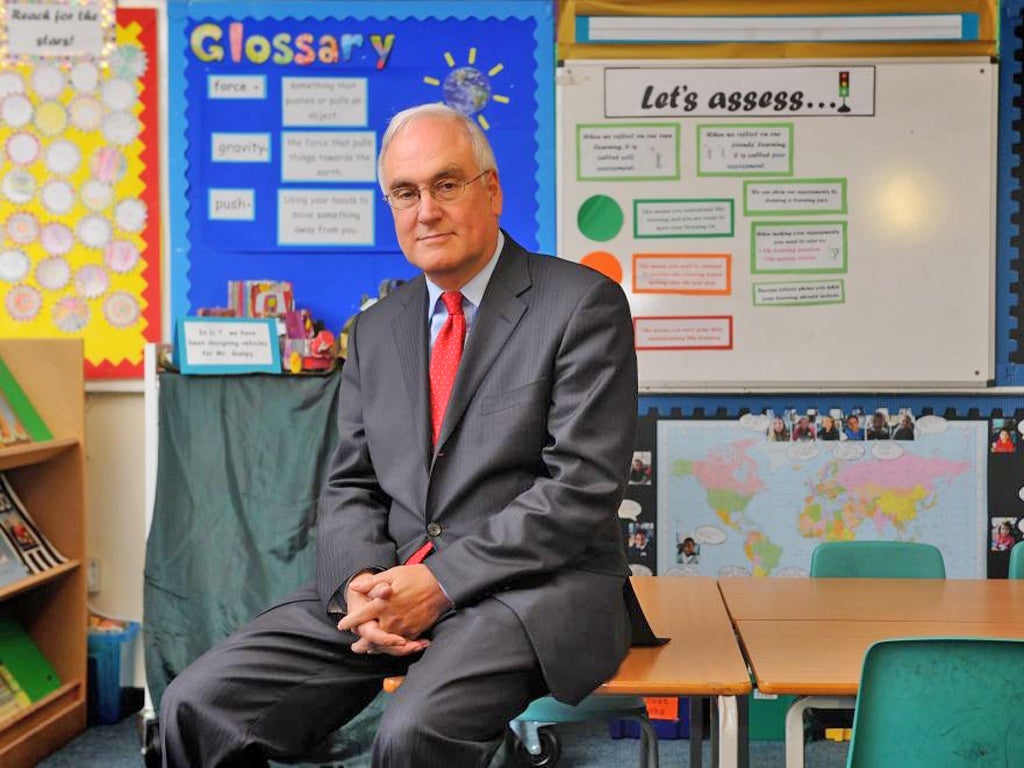Wealthy suburban schools risk losing 'outstanding' status over failing poorest pupils, warns Ofsted chief
Sir Michael Wilshaw says affluent West Berkshire is the worst place in England to be a child from a poor family

Your support helps us to tell the story
From reproductive rights to climate change to Big Tech, The Independent is on the ground when the story is developing. Whether it's investigating the financials of Elon Musk's pro-Trump PAC or producing our latest documentary, 'The A Word', which shines a light on the American women fighting for reproductive rights, we know how important it is to parse out the facts from the messaging.
At such a critical moment in US history, we need reporters on the ground. Your donation allows us to keep sending journalists to speak to both sides of the story.
The Independent is trusted by Americans across the entire political spectrum. And unlike many other quality news outlets, we choose not to lock Americans out of our reporting and analysis with paywalls. We believe quality journalism should be available to everyone, paid for by those who can afford it.
Your support makes all the difference.Schools in England's wealthiest suburbs risk losing their "outstanding" status if they fail to improve the performance of their poorest pupils, warns the education standards watchdog Ofsted.
The chief schools inspector Sir Michael Wilshaw said the worst offenders in terms of neglecting disadvantaged pupils were often those in the leafy suburbs with only a handful of pupils on free school meals.
"Where do you think is the worst place in England to be a child from a poor family, in terms of educational opportunity?" he asked an audience of headteachers and senior educationalists in London today. "The evidence suggests it's West Berkshire.
"Disadvantaged children in this lovely, affluent part of south-east England last year had: the worst attainment in the whole country at primary school, the second worst at secondary school and were in the bottom three local authorities for attainment at 19.
"West Berkshire is an example of a much wider problem affecting the relatively prosperous counties of south-east England, On the surface, education outcomes for these areas may look good but, for children eligible for free school meals, they hide deep and shocking failure.
Sir Michael announced that all schools shown to be neglecting their poorest pupils would now be re-inspected and would not be allowed to retain the rating "outstanding" if they failed to improve the performance of their poorest pupils.
Research published by Ofsted, "Unseen Children: access and achievement 20 years on", showed that the performance of disadvantaged pupils in some authorities at GCSE - notably the Isle of Wight and Shropshire - had worsened in the past five years.
It concluded that poverty of expectation was, indeed, a greater problem than material poverty in shackling the performance of disadvantaged pupils. In 30 schools, not a single pupil on free school meals got five A* to C grade passes at GCSE including maths and English.
"Children from disadvantaged backgrounds very often have high ambitions, especially when they are young," said Sir Michael. "But the odds against them achieving can worsen with age.
"All too often there comes a point at which expectations shrink. They don't see their elder siblings going to university, so they think it's not for them. Or no-one in their household is in paid work, so they don't expect to get a job.
"We know of examples of schools serving areas of great disadvantage that are doing very well by their children," he added. "It is true that many families find it hard to make ends meet. But the children of poor families with high aspirations do better at school than those whose parents and teachers expect little of them."
Figures cited in the research showed that the worst performers - by a long chalk - were white British working-class pupils. Only 26 per cent of British white-working class boys and 35 per cent of British white working-class girls obtained five A* to C grade passes including maths and English last year. Black Caribbean boys and girls - with 32 per cent and 48 per cent respectively were the second worst performers.
"Five years ago Bangladeshi and Black African pupils were trailing their white British counterparts," it said. "Now Bangladeshi pupils outperform their white British peers and black African pupils perform at a similar level.
"While girls outperformed boys across all of the main ethnic groups, the achievement of white British girls eligible for free school meals was below that of low income boys from other ethnic groups with the exception of black Caribbean boys. The poor performance of low income white British pupils is not, therefore, a gender issue."
Today's research coincided with the publication of new statistics from the Department for Education showing one in three state secondary schools failed to send a single pupil to Oxford or Cambridge last year. The statistics, showing for the first time the destination of school leavers, showed three state schools - St Benedict's Catholic school in Suffolk, Dame Alice Owen's in Hertfordshire and Cardinal Vaughan Memorial school in Kensington and Chelsea - tied for first place, sending seven per cent of their pupils to Oxbridge.
"These statistics demonstrate the gulf between the schools and colleges which deliver for their students - and those which do not," said Schools Minister David Laws.
Join our commenting forum
Join thought-provoking conversations, follow other Independent readers and see their replies
Comments